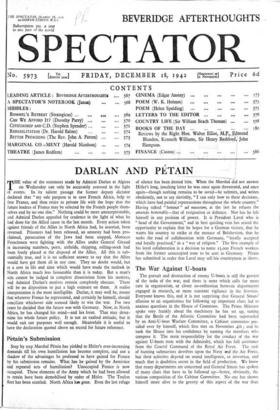The War Against U-boats
The pursuit and destruction of enemy U-boats is still the gravest of the tasks of the war, and there is none which calls for more care in organisation, or closer co-ordination between departments engaged in research, or more constant vigilance in the Services. Everyone knows this, and it is not surprising that General Smuts' allusion to an organisatioa for following up important clues led to anxious questions in the House of Commons. The Prime Minister spoke very frankly about the machinery he has set up, stating that the Battle of the Atlantic Committee had been superseded by an Anti-U-boat Warfare Committee, a Cabinet committee pre- sided over by himself, which first met on November 4th ; and he took the House into his confidence by naming the members who compose it. The main responsibility for the conduct of the war against U-boats rests with the Admiralty, which has full assistance from the Coastal Command of the Royal Air Force. The task of hunting submarines devolves upon the Navy rind the Air Force, but their activities depend on sound intelligence, or invention, and much that is doubtless secret in the field of production. We know that many departments are concerned and General Smuts has spoken of many clues that have to be followed up—hence, obviously, the various composition of the Cabinet Committee. No one has shown himself more alive to the gravity of this aspect of the war than the Prime Minister himself, and he gives it his constant personal .attention. We were told last summer that the rate of Allied ship- building had overtaken the rate of loss, and it is hoped that that balance is still in our favour. None the less, the acceleration of enemy construction of U-boats is such that it would be too much to suppose that our measures against them have decreased their number or even prevented it from increasing. Submarine warfare is the main hope to which the enemy clings, and the most formidable obstacle to our victory.



























